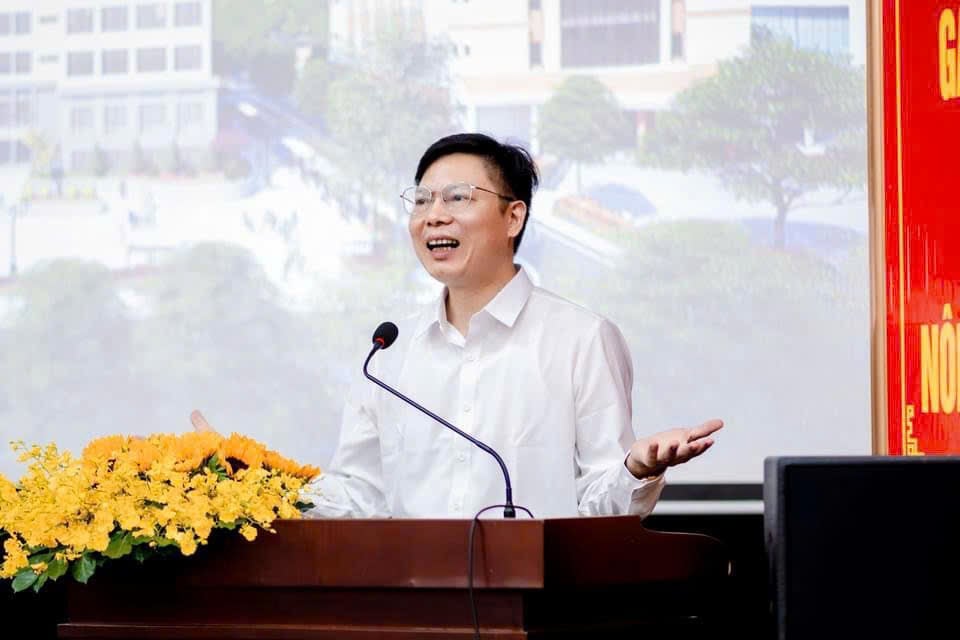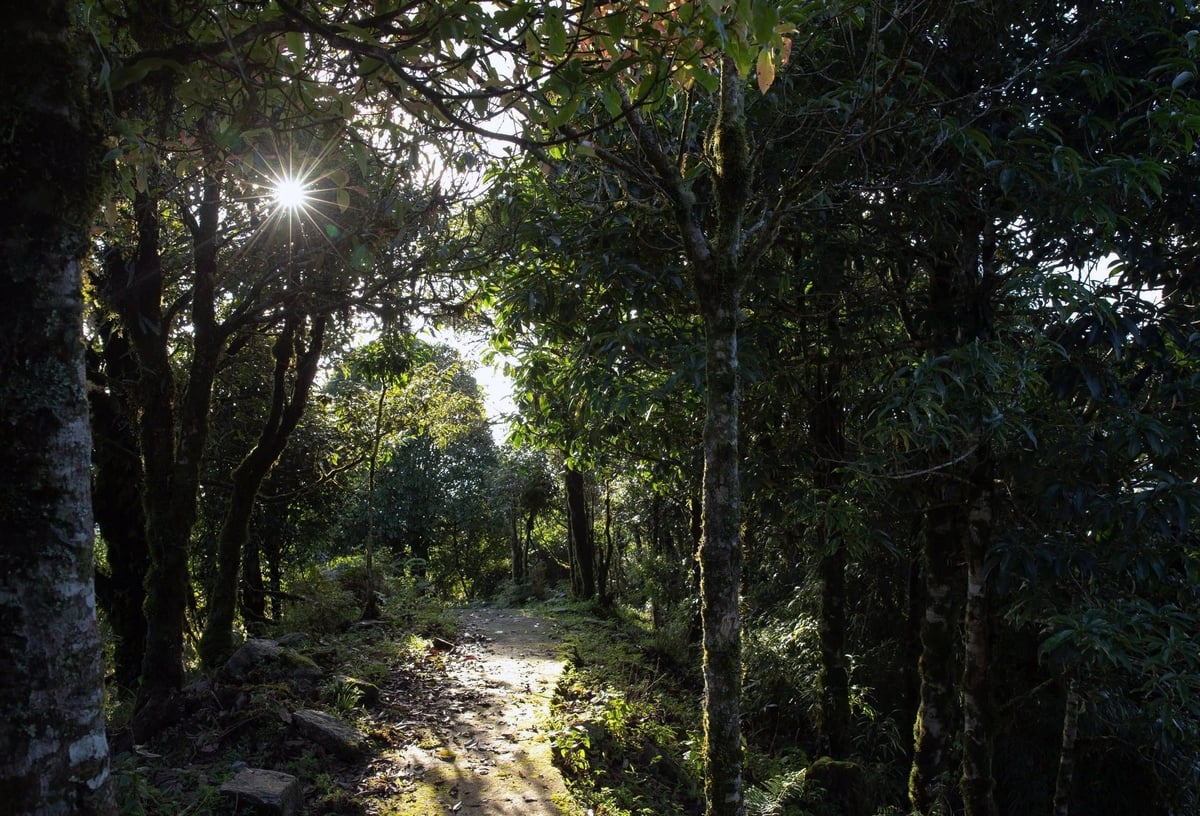December 31, 2025 | 09:50 GMT +7
December 31, 2025 | 09:50 GMT +7
Hotline: 0913.378.918
December 31, 2025 | 09:50 GMT +7
Hotline: 0913.378.918
Vietnam’s forestry sector is facing tremendous challenges. Intensifying climate change, with tropical storms, droughts, and severe cold spells, has caused significant damage to forests. In many areas, forest land has been degraded, eroded, landslided, and dried out. Not only has the forest ecosystem suffered, but the livelihoods of forest-dependent communities have also been adversely affected.

Teacher, Prof. Dr. Pham Van Dien, Rector of Vietnam National University of Forestry. Photo: VNUF.
On the commercial front, new regulations such as the EUDR (EU Deforestation Regulation), CBAM (Carbon Border Adjustment Mechanism), along with increasingly stringent green certification systems and traceability requirements, are posing direct challenges to forest product exports. Vietnam has become one of the world’s top five exporters of timber and wood products, yet just a single non-transparent shipment could jeopardize the reputation of the entire sector. Moreover, foreign goods taking advantage of Vietnam for tax evasion through re-export, as well as cheap imports lacking transparency, continue to exert pressure on domestic enterprises.
At the same time, with a population of over 100 million and rapid urbanization and industrialization, the demand for land for agriculture, infrastructure, and industrial zones is rising, creating fierce competition with forest land. In the upland regions, which account for more than 70% of Vietnam’s forests, tens of millions of ethnic minority people live, many of whom still face difficult livelihoods and depend heavily on forest exploitation.
Where poverty persists, livelihood pressures can easily turn into pressures to clear forests. Furthermore, the Net Zero commitment by 2050 places a historic responsibility on the forestry sector: not only to protect but also to improve forest quality, reduce emissions throughout the value chain, and participate effectively in the global carbon market.
Despite numerous challenges, forests remain the ecological security pillar of the nation. With over 14.7 million hectares and a forest coverage rate of 42.03%, Vietnam’s forests serve as a green shield, protecting soil, water, and the living environment of millions of people. They also form the foundation for ecosystem services, absorbing carbon dioxide, mitigating natural disasters, and helping the country adapt to climate change.

A corner of the forest on the peak of Chieu Lau Thi, Ho Thau, Tuyen Quang. Photo: Khuong Trung.
Forests are not only an ecological shield but also an invaluable economic asset. In 2024, Vietnam’s export turnover of wood and non-timber forest products reached over USD 17 billion, affirming its position among the world’s top five exporters. If forests are managed and used more effectively, with stronger deep processing and better-managed value chains, they will become a true green gold mine, which is a long-term profitable asset for the nation.
Forests also hold strategic diplomatic significance. On global forums about climate and sustainable development, forests serve as Vietnam’s “soft ballot,” reinforcing its international reputation. With the rare advantage of possessing both “golden forests and silver seas,” Vietnam can strategically link upstream forests to coastal mangroves, forming a distinctive green axis that creates a unique advantage for sustainable development.
The forestry sector today is not the same as before. Breakthroughs no longer lie in expanding forest plantations or increasing processing output, but in managing the entire value chain. From import, production, processing, consumption to export, every stage must be transparent, efficient, and mutually beneficial.
The co-management model among the State, enterprises, and communities needs to be promoted so that all stakeholders in the value chain both benefit and take responsibility. This is the golden key to closing commercial loopholes, preventing illegal goods, safeguarding national credibility, and enhancing the true value of Vietnam’s forests and forest products.
A cornerstone of future forestry lies in carbon strategy and green products. Beyond selling carbon credits, Vietnam can produce biochar considered “black gold”, which not only stores carbon long-term but also improves soil quality and commands high value. In addition, high-value products such as wood-based chemicals, essential oils, cosmetics, pharmaceuticals, biomaterials, and green packaging will form the foundation for a green industry from forests, turning Vietnam into a regional hub for high-tech forestry economy.
In the wood industry, Vietnam already holds a global position but still lacks creative branding. Moving forward, the country needs to establish high-tech wood processing centers, develop design-furniture-creative industry clusters, and accelerate the adoption of green technologies, energy efficiency, and emission reduction. The international market must recognize Vietnamese wood not just for its large volume, but for its design quality, technological content, and sustainability.
People are the root of industry development. It is essential to support the establishment of an international tropical forestry training center, making Vietnam a destination for the Asia-Pacific region. At the same time, digital transformation should be seen as a new pillar: a national database on forests -forest products - carbon - forestry value chains, AI-powered monitoring and management, and a comprehensive electronic traceability system.
Forestry diplomacy is Vietnam’s new form of soft power. Proactive participation in ASEAN and global forestry networks, along with mobilizing resources from REDD+, the Green Climate Fund, and green finance projects, will provide greater strength to protect and develop forests. Vietnam’s forests are not only a national asset but also a green passport enabling deeper international integration for a greener planet.
Investing in forestry means investing in a green future, in ecological security, and in the country’s sustainable development. Forestry is not only about protecting forests, aslo known as the green lungs,but also about securing livelihoods for people, preserving markets for businesses, and safeguarding national prestige on the international stage. At present, Vietnam is still playing a supporting role in the global value chain.
However, as outlined above, Vietnam has every opportunity to become a reputable and effective tropical forestry hub of global standing, a convergence point for sustainable livelihoods for tens of millions of upland people, while simultaneously enhancing national prestige and soft power.
Translated by Kieu Chi

(VAN) Located in three former provinces, Nam Dinh, Thai Binh, and Ninh Binh, and now in two provinces, Ninh Binh and Hung Yen, "Red River Delta" is the name of Vietnam's first interprovincial coastal wetland World Biosphere Reserve.
/2025/12/29/1046-1-210728_624.jpg)
(VAN) In 2025, Viet Nam recorded severe and extreme disasters, breaking multiple historical records and causing heavy losses in lives, property, and infrastructure nationwide.

(VAN) Applied technologies, water-saving irrigation is a strategic solution to promote climate-resilient agriculture and strengthen water security in the uplands.
/2025/12/29/3936-3-163422_251.jpg)
(VAN) Can Gio mangrove forest in particular and the entire Can Gio Mangrove Biosphere Reserve in general hold great potential for carbon credits.

(VAN) Chu Pah Rubber has announced its products that comply with the EU Deforestation Regulation (EUDR), affirming its commitment to sustainable production and product origin transparency.

(VAN) Deputy Director Nguyen Hoai Nam stated that a digital data platform will be developed with agricultural sector databases, utilizing AI to help farmers make informed decisions on 'watering correctly, sufficiently, and efficiently.’
/2025/12/29/4841-2-134224_777.jpg)
(VAN) From only about 10 individuals in 2009, the wild elephant population in Dong Nai has recovered to nearly 30 animals after more than 10 years.